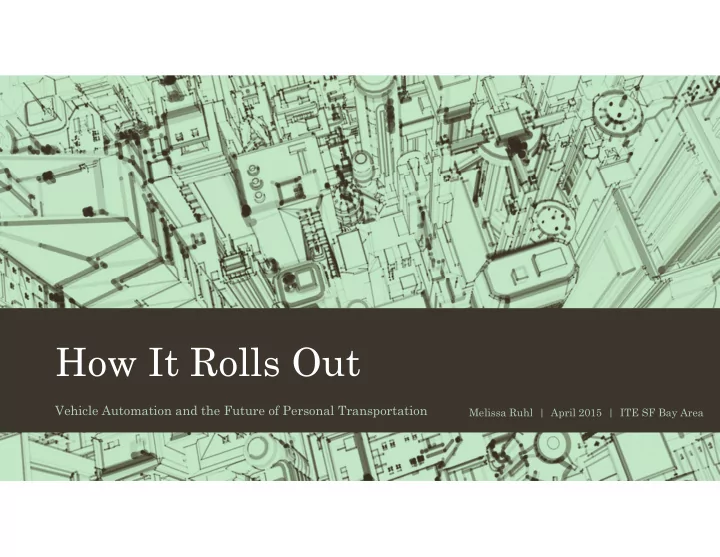

How It Rolls Out Vehicle Automation and the Future of Personal Transportation Melissa Ruhl | April 2015 | ITE SF Bay Area
The horseless carriage?
Where are we at today?
Where are we at today?
Defining vehicle automation Level 4 (autonomous Level 3 or self- (autonomous driving cars) Level 2 (two driving in automated some Level 1 (one functions situations) automated working function) together)
A Range of Issues • Technical issues • Legal issues • Societal issues • Inclement weather • Liability • Cost of the vehicles • Complete mapping • Legality and regulation • Trust in the automation • Pothole depth detection • Cyber security • Love of driving • Roadway construction • Data privacy • Metal to radar interference • Lighting: glare and dark • Lingering computer vision issues • Cost of the technology And more…
We’ve come a long way 1939: Futurama Exhibit
We’ve come a long way 1960s-70s: AI Golden Age of research and 1939: Futurama funding Exhibit 1956: Coining of the term “Artificial Intelligence”
We’ve come a long way 1960s-70s: AI Golden Age of research and 1939: Futurama funding Exhibit 1986: Founding 1956: Coining of of UC Berkeley the term PATH “Artificial Intelligence”
We’ve come a long way 2005: Second DARPA Grand Challenge 1960s-70s: AI Golden Age of 2000: research and 1939: Futurama Congressional funding Exhibit mandate 2007: Urban DARPA Grand 1986: Founding 1956: Coining of Challenge of UC Berkeley the term PATH “Artificial Intelligence” 2004: First DARPA Grand Challenge
We’ve come a long way 2005: Second DARPA Grand Challenge 1960s-70s: AI 2010: Google Golden Age of announces Self- 2000: research and Driving Car 1939: Futurama Congressional funding Project Exhibit mandate 2007: Urban DARPA Grand 1986: Founding 1956: Coining of Challenge of UC Berkeley the term PATH “Artificial Intelligence” 2012: Google 2004: First shares Steve DARPA Grand Mahan video Challenge
2014: Google 2014: Apple We’ve come a long way Self-Driving begins car 2005: Second Car initiative DARPA Grand Prototype Challenge 2015: Uber 1960s-70s: AI 2010: Google announces Golden Age of announces Self- self-driving 2000: research and Driving Car 1939: Futurama car program Congressional funding Project Exhibit mandate 2015: Delphi 2013: Toyota car first to autonomous cross the US concept car 2015: 2014: Tesla Mercedes- predicts it will 2007: Urban Benz sell first self- DARPA Grand 1986: Founding 1956: Coining of autonomous driving car Challenge of UC Berkeley the term concept car PATH “Artificial 2015: Nissan Intelligence” 2012: Google and NASA 2004: First shares Steve autonomous car DARPA Grand Mahan video partnership Challenge
Behind autonomous car R&D, we now have… • Tens of thousands of researchers and engineers • Unprecedented computational power • Billions of dollars • Market demand The leap path may be possible.
Transportation today Transit use Bicycling Walking VMT Teens getting licenses
Incremental Path Highway driving becomes more efficient and more pleasant.
Incremental Path Increased highway capacity Separated lanes for more efficient self-driving cars Platooning
Incremental Path Highway driving becomes more efficient and more pleasant. Driving and car ownership become more appealing again.
Incremental Path Highway driving becomes more efficient and more pleasant. Driving and car ownership become more appealing again. Travel behaviors do not substantially change.
Leap Path If self-driving cars become available and legal, a shared autonomous vehicle service is inevitable.
Leap Path: 3 Big Benefits Higher fleet turnover Faster integration of electric vehicles
Leap Path: 3 Big Benefits Reduced need for parking
Leap Path: 3 Big Benefits End of car ownership?
The leap path is the more sustainable, more revolutionary path. How do we get there?
Thank you! Questions? Melissa Ruhl | melissaruhl@gmail.com
Recommend
More recommend